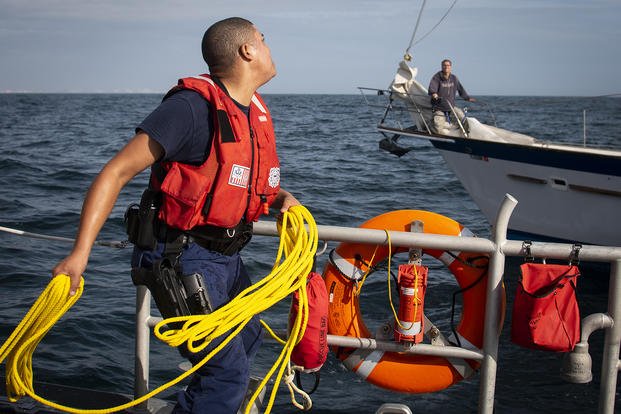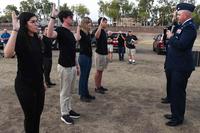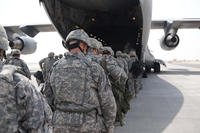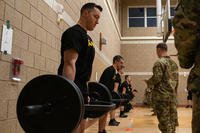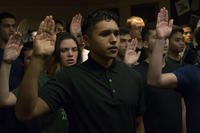Thinking about joining the Coast Guard? We answer the top questions recruits have here and offer hints on how to make joining easier and finding that dream job in the service.
What Is the US Coast Guard?
The Coast Guard is unique because it is not part of the Defense Department. It has a unique position as part of the Department of Homeland Security. However, the Coast Guard is considered a military service, because, during times of war or conflict, the president can transfer any or all assets of the Coast Guard to the Department of the Navy. In fact, this has been done in almost every single conflict that the United States has been involved in. The Coast Guard is commanded by a four-star admiral, known as the Coast Guard commandant.
As of early 2021, the Coast Guard's 40,500 active-duty people, more than 6,200 Reservists and more than 22,000 Auxiliarists serve in jobs ranging from communication specialists to small-boat operators and from maintenance specialists to aviation mechanics. According to its Posture Statement and 2021 Budget Overview, the Coast Guard accounted for:
- 458,436 pounds of cocaine and 63,282 pounds of marijuana, with an approximate street value of $6.2 billion, removed.
- 611 suspected smugglers detained for prosecution.
- 6,107 undocumented migrants interdicted at sea.
- 185 incursions into the U.S. Exclusive Economic Zone (EEZ) detected, resulting in the interdiction of 119 vessels.
- 138 foreign vessels boarded to suppress illegal, unreported and unregulated fishing.
- 7,052 U.S. fishing vessels boarded, resulting in 148 significant fishery violations.
- 49 reports to assist with stranded, distressed or entangled animals.
What Are the Qualifications to Join the Coast Guard?
The following are the basic requirements for joining. You must:
- Be a U.S. citizen or nationalized to be a Coast Guard officer.
- To enlist, you must be a U.S. citizen or a resident alien.
- Be between the ages of 17-42. Seventeen-year-olds need parental consent.
- Have a high school diploma.
- Take and pass the Armed Services Vocational Aptitude Battery (ASVAB) test.
- Pass a Military Entrance Processing Station medical exam.
- Have a willingness to serve on or around the water.
What's the ASVAB?
The ASVAB is a test that measures your aptitudes. It consists of 10 short individual tests covering word knowledge, paragraph comprehension, arithmetic reasoning, mathematics knowledge, general science, auto and shop information, mechanical comprehension, electronics information, numerical operations and coding speed. When you take the ASVAB before enlisting, not only do you receive scores on each of these individual tests, but several individual test results are combined to yield three academic composite scores: verbal, math and academic ability.
What Are Some Benefits of Joining?
- Steady Income: You are paid twice a month, on the first and 15th, every month, based on your pay grade and service requirements.
- Advancement: You are promoted based on job knowledge, your performance, time in pay grade and service requirements.
- Paid vacation: You earn 2.5 days of paid vacation per month for a total of 30 days each year, up to 60 days.
- Training: You choose your career path based on your aptitude, physical abilities, security clearance, motivation and determination. All specialties are open to women -- including combat roles.
- Health care: While on active duty, you will receive complete medical and dental care at no cost.
- Life insurance: Active-duty members select up to $400,000 in term life insurance for a low price.
- Allowances: You also may receive additional tax-free money for Basic Allowance for Housing (BAH) if government housing is not available; Basic Allowance for Subsistence (BAS), if government food facilities are not available in the area you are stationed; and a uniform allowance (for enlisted personnel only) to help maintain your uniform.
- GI Bill: The GI Bill will help pay for college education or vocational training.
- Tuition assistance: While on active duty, you may continue your education and may be helped in defraying the cost of college-accredited courses.
- Additional benefits: There are exchange and commissary privileges, moving allowances, temporary lodging expenses, travel, survivor benefits, Veterans Affairs home loans and more.
Do I Have to Join Another Branch of Service First?
No. You do not have to join another service before joining the Coast Guard. However, if you previously joined another branch, the Coast Guard takes people with prior military service.
Does the Coast Guard Take People with Prior Service?
Yes. The Coast Guard accepts prior-service people.
What if I Am Not a US Citizen?
Only U.S. citizens or foreign nationals legally residing in the United States with an Immigration and Naturalization Service Alien Registration Card (or "green card" -- INS Form I-151/551) may apply. Applicants must speak, write and read English fluently.
Can the Coast Guard Help Me Obtain US Citizenship?
No. The U.S. military cannot assist foreign nationals in obtaining admittance into the United States.
What if I Live Overseas?
Regulations prohibit the forwarding of recruiting information through international mail, even to U.S. citizens living in foreign countries.
How Long Is Boot Camp?
Eight weeks.
Where Is Boot Camp?
Boot camp is located at the training facility in Cape May, N.J.
What Is Boot Camp Like?
Boot camp is mentally and physically tough. It prepares you for life in the Coast Guard. Much of your training will take place in a classroom learning first aid, firefighting, weapons handling, practical seamanship and general Coast Guard knowledge. You will have daily physical fitness and water survival classes. You also will learn military drill and the "ropes" of the U.S. Coast Guard.
Should I Do Anything Before I Go to Boot Camp?
Yes. After you enter the delayed entry program (DEP), you will receive a copy of the "Helmsman," a recruit guidebook. Study the entire book. Pay particular attention to the list of items you cannot bring to boot camp, the 11 general orders and the position of attention. Also prepare yourself for running and physical fitness training.
How Do I Become an Officer?
You can become an officer through the Coast Guard Academy, Officer Candidate School (OCS) or one of several direct commissioning programs.
What Is the Coast Guard Academy?
The Coast Guard has been training service cadets since 1877, when cutters (Coast Guard vessels longer than 65 feet) were used as training platforms. The Coast Guard Academy in New London, Connecticut, was established in 1931, and is accredited fully by the New England Association of Schools and Colleges. All engineering majors are accredited by the Accreditation Board of Engineering and Technology.
More than 200 cadets enter training each year. Classroom sizes range from 20 to 25 students. Nearly 75% of the cadets graduate with engineering, science or mathematics degrees: civil, electrical, mechanical engineering, naval architecture, marine engineering, marine science, mathematical and computer science, government and management.
How Do I Apply to the Coast Guard Academy?
To apply, you should have competitive Scholastic Aptitude Test scores (SAT) and cannot have reached your 22nd birthday. Unlike other service academies, no congressional sponsor is required. To apply, please visit the academy's website. For questions about information not found online, please call the admissions office at 860-444-8500.
What Is Officer Candidate School?
Officer Candidate School (OCS) is 17 weeks of training in New London. Studies include nautical science, law enforcement, seamanship and leadership. Graduates are commissioned ensigns (O-1) in the Coast Guard Reserve with a three-year initial active-duty obligation.
How Do I Apply for OCS?
If you have a four-year college degree from an accredited college and meet the age, physical and moral requirements, you may apply for OCS. The application process includes scoring a minimum of 110 on the Armed Forces Aptitude Battery test (ASVAB) and passing your physical given at a MEPS. Your SAT or ACT scores also will be needed. Upon completion of your officer package, you will have an interview with three Coast Guard officers. The completed package will be submitted to a board, which will select the top candidates from the packages they receive.
What About Direct Commissions?
As a professional lawyer, engineer, maritime graduate or environmental manager, you also may qualify for a Coast Guard Direct Commission. Successful applicants attend a four-week school at New London and receive a reserve commission as an ensign, lieutenant junior grade or lieutenant, depending on your education and experience.
Are There Promotions to Officer Rank from Within the Coast Guard Enlisted Ranks?
Yes. Coast Guard enlisted members may compete for OCS slots if they have four years of service, obtained the rank of E-5 or above and have at least 30 college credits. Coast Guard enlisted people also may work up through the ranks to chief warrant officer, then may attend OCS or apply for the Coast Guard's warrant-to-lieutenant program.
What if I'm a Physician or Dentist?
The Coast Guard also is seeking qualified health professionals. For more information about our medical programs, click here.
Does the Coast Guard Have Reserve Opportunities?
Yes. The Coast Guard Reserve is a part-time force of about 8,000, specially trained people who serve with the Coast Guard one weekend a month and two weeks every year. Coast Guard Reservists work directly alongside active-duty Coast Guard personnel and perform the same jobs as active-duty personnel.
What Are the Qualifications to Join the Reserve?
You must be between 17 and 40 years old. You must not be employed in a civilian occupation essential to U.S. interests during time of war. You must not have served more than 13 years of active military duty.
What Is an RK, RP or RY?
These are enlisted personnel who go to boot camp as Phase I of their initial active duty for training (IADT). Phase II of the training differs. An RK is a student who returns home after boot camp and returns to a civilian school. The summer after boot camp, you usually attend Class "A" school. Between boot camp and A-school training, you'll drill two days per month. An RP reports directly to A-school after boot camp and begins monthly drills after school. An RY reports directly to a Coast Guard unit after boot camp and serves 30 days of active duty to complete IADT. You'll then start your monthly drills.
What Is a drill?
This applies to the Reserves. Drills are periods of inactive duty training (IDT), under orders, scheduled to augment training. No more than two drills can be performed on one calendar day, and each drill must be at least four hours long. Most units schedule multiple drills over one weekend each month (two drills Saturday and two drills Sunday).
What Training Will I Receive?
Depending on the program, you will receive boot camp and maybe A-school training. Weekend or weekday drills are considered training. Active duty for training (ADT) is 12 days of active duty at a Coast Guard unit or Coast Guard school and is required annually.
What if I Have a Problem Getting Time Off from My Employer to Fulfill My Military Service Obligations?
By law, as a member of the Reserve, you, upon request, must be granted a leave of absence to satisfy a requirement for military training. The Uniform Services Employment and Reemployment Rights Act requires employers to provide Reservists with time away from their jobs to perform military duty. However, you must notify your employer that you intend to take military leave. You must be reemployed after completion of your military duty and return to your job within a reasonable time. You must be treated as though you had never left employment, including scheduled pay raises, promotions or credit for longevity or vacation. Your employer only has to hold a job open for 60 months if you accept voluntary orders.
How Do I Become a Coast Guard Pilot?
You must first be a Coast Guard officer or a graduate of another armed service's flight school with active-duty pilot experience. Previous military pilots may apply for direct commission aviator positions.
Commissioned officers in the Coast Guard may apply for flight school and will be placed on a school waiting list once accepted.
Qualifications:
Flight-school candidates must pass a Class 1 flight physical. A dental exam will check for cavities and other problems that may be affected by changes in air pressure during flight.
Vision requirements are also very stringent. Eyesight should be 20/20 or correctable to 20/20, no exceptions. Uncorrected visual acuity must be better than 20/200 in either eye. There are other limitations imposed based on the type and strength of the lens prescription. In addition, normal color perception, depth perception and field of vision are required.
What Will I Do at My First Duty Station?
It depends on your unit. Life at a small station is different than life on a ship. Most boot-camp graduates receive orders to a ship. You will start to perform the duties of a crewman at your unit. You must learn everything about your ship and/or small boats at your station. You may go on rescue missions, assist with law enforcement, work aids to navigation or other missions.
How Do I Choose My School?
You can attend any school for which you qualify. The results of your ASVAB determine your qualifications. All of the schools have a waiting list. They range from a few months to more than two years. You must have a minimum of 30 months remaining on your enlistment before you can enter any Class A school. If the school you want has a very lengthy wait, you may need to extend your enlistment a number of months to bring the total left on your enlistment to 30 months.
Is Class A School Like Boot Camp?
No. This is training for a specialty you have chosen. It may involve work details and duty, but the main focus is on technical and professional training.
Will I Be Paid While at Class A School?
Yes, you will be paid for every day you're in the Coast Guard. You will receive pay according to published pay schedules for your pay grade, along with any temporary duty or travel allowances.
What Should I Ask My Recruiter?
Coast Guard recruiters must present an accurate picture of Coast Guard training. You should be aware of all aspects of the Coast Guard environment. Be sure you fully understand the enlistment contract. You should ask about:
- Details and qualifications for each specialty.
- Films or videos about training and duties.
- Boot camp (There is a video called "Training to Be Part of the Action.")
- Length and location of training.
- Special enlistment programs if you have completed Junior ROTC or sea cadet training.
- Overseas assignments, remote and long duty.
- Haircut and grooming standards.
- Off-duty education and educational benefits.
- Guaranteed training programs.
Visit the Military.com Uniform Center for details on military uniforms.
Interested in Joining the Military?
We can put you in touch with recruiters from the different military branches. Learn about the benefits of serving your country, paying for school, military career paths, and more: sign up now and hear from a recruiter near you.
